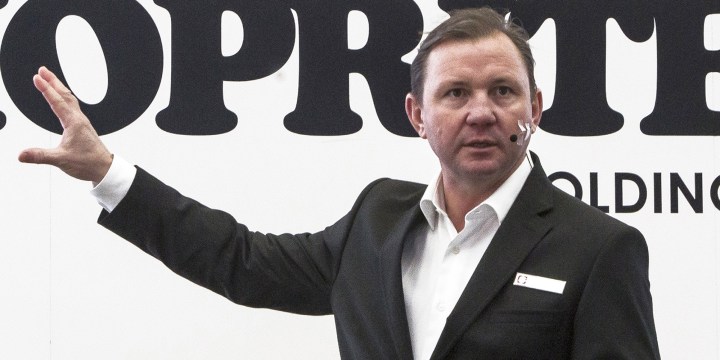BUSINESS MAVERICK
Shoprite CEO’s dilemma: How much change is enough?

One of the few constants in life is change — except at Shoprite, it would seem. While the CEO of 37 years is long departed, the chair, Christo Wiese, is clinging to the position. Change in a relentless consumer environment is necessary, and good, which means it is up to the CEO to stare down his chairman if necessary.
The combination of Whitey Basson and Christo Wiese as CEO and chairman respectively of retailer Shoprite was arguably one of the most effective yet seen. Wiese trusted Basson implicitly, leaving him to get on with the job of building a retail empire, stepping forward to provide support only when called for.
The result was explosive growth which, at its height, saw the group grow from 241 stores in 1997 to 2,779 in 2019, from 20,000 employees to 147,268 in the same period and R9.4-billion in sales to R150-billion in sales.
Under their watch, the group expanded into 14 other sub-Saharan countries, which contributed 25.1% of total group sales in 2019.
With the retirement of Basson in 2016 after 37 years at the helm and the recent announcement that Wiese will step down within the year as executive chairman (after 28 years in the seat), it seems this swashbuckling era is drawing to a close.
Despite these changes, quite how much freedom incumbent CEO Pieter Engelbrecht has to truly run the show as he sees fit, remains to be seen. After all, Wiese is the biggest shareholder in the company with a direct shareholding of 14.8% and deferred shares that account for a further 32% of the voting rights.
These shares came in handy when he survived an attempted coup, using them to vote himself back on to the Board at the AGM held on 4 November 2019 — without them, Wiese would not have been returned as chairman.
This means that even when he is an ordinary director Wiese could still have the wherewithal to push through decisions that are aligned to his own personal agenda, much to the chagrin of institutional shareholders.
Thus, of more interest to investors than the potential successors being toted around, is what will happen to these deferred shares.
Earlier in 2019, a Shoprite motion to buy out Wiese’s high-voting deferred shares for R3.3-billion and convert them into ordinary shares was voted down by minority shareholders — the deal had a very high voting threshold.
Had the deal gone through, it would have reduced Wiese’s voting power at Shoprite to 17.8%.
There has been no further discussion about these shares and the control structure in general. While it remains on the board’s to-do list, Engelbrecht has little choice but to move on and quietly stamp his mark on the group operationally.
And this he is doing.
The next era will look quite different, he told investors at the release of the company’s results to June 2019.
“We are shifting from explosive expansion to an era of precision retailing.”
First, he got the people right.
Succession planning was not Basson’s strong point and his departure was marked by an exodus of senior managers, most of whom had reached retirement age. Engelbrecht has used this opportunity to restructure and pick his preferred replacements — even if they came from within. This includes CFO Anton de Bruyn, who was appointed in July 2018.
“Executives are well supported by an expanded management team,” Engelbrecht wrote in the latest annual report. “We have restructured so that each segment is led by a chief operating officer.”
Then he invested in technology, after years of underspending.
The group has completed the implementation of an enterprise-wide system across the business, which allows for better planning, supply chain management, sales and supporting activities, including compliance.
This is just the beginning.
The expanded IT infrastructure and capabilities mean the group can, for the first time, harness data analytics to generate customer insights — essential if you want to sell people more of what they don’t really need. In tandem, Shoprite has rolled out a customer loyalty programme, eight years after Pick n Pay did so.
At the time, the concept was derided by Basson, who could not see the value of investing in anything that sacrificed hard-fought-for margins for something as intangible as customer loyalty and data.
The group will also use technology to significantly refine and expand its online offering, complemented with new services such as on-demand home liquor delivery.
But it has not all been smooth sailing. Shortly after Engelbrecht assumed the hot-seat, the oil price collapsed, sending the Nigerian and Angolan economies into freefall. From being a net contributor to group earnings, the rest of the Africa business became a drain.
In the last financial year, Shoprite’s diluted headline earnings per share contracted by 19.6%. This was on the back of sales that grew just 3.6% to R150.4-billion, and trading profit that declined to R6.9-billion, a drop of 14.3% on the previous year.
As a result, the consolidated trading margin declined to 4.6% (from 4.9%) and the group’s return on invested capital (ROIC) declined from 14.8% to 11.0% in 2019.
“Christo and Whitey’s great vision was to expand into the townships before anyone else realised the power of this retail market,” says Asief Mohamed, CIO of Aeon Investment Management. “But they were also lucky in that they rode the consumer wave following the introduction of social grants and the expansion of the public service.
“Engelbrecht has faced criticism, but Whitey would have had to face the very same headwinds had he still been in charge.”
Shoprite’s biggest market is the lower end of the market and there they must be taking a beating, adds independent retail analyst Chris Gilmour.
“This sector is only defensive when the economy is playing ball and employment is stable. But right now unemployment, and crime, are headaches no CEO wants to be dealing with.”
Engelbrecht is well aware that investors are concerned about the group’s declining ROIC, the composition of its board, remuneration policy and shareholding structure, in particular.
Where he is most comfortable is operationally, which is as it should be.
“We aim to improve our ROIC from 11.0% to a range of 14.5% to 16.5% by 2022,” he wrote in the annual report.
Investment will be balanced with tighter management of capital. Value will be unlocked on the balance sheet by selling and leasing back certain assets such as selected trucks, real estate and distribution centres, he adds.
“No one expected or wanted Pieter to run the shop as Whitey had done,” says independent analyst Syd Vianello, “but there is no doubt that he has started to make his mark felt quite quickly.”
This is possibly a good thing. After years of poor performance and declining market share, Shoprite was beginning to feel uncomfortable about the resurgence of Pick n Pay.
“[Pick n Pay CEO Richard] Brasher’s strategy has borne fruit. He right-sized the business, got rid of the deadwood and is clawing back market share,” says Gilmour.
To compete with a resurgent competitor in a flat economy means the Shoprite CEO must lead a company that is innovative and agile. This means not travelling the path forged by his predecessor, but one of his own. It would be useful to have a chairman that has his back. BM


















 Become an Insider
Become an Insider